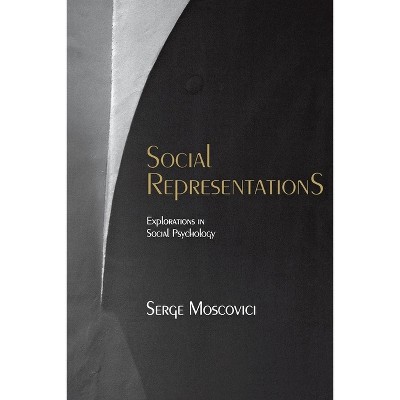Invention of Society - (Psychological Explanations for Social Phenomena) by Serge Moscovici (Paperback)

About this item
Highlights
- This brilliant and original book sets out to dismantle the idea that movements, crises and other phenomena produced in society must be explained by exclusively social causes, without recourse to psychological explanations.
- About the Author: Serge Moscovici and are the authors of The Invention of Society: Psychological Explanations for Social Phenomena, published by Wiley.
- 416 Pages
- Social Science, Sociology
- Series Name: Psychological Explanations for Social Phenomena
Description
Book Synopsis
This brilliant and original book sets out to dismantle the idea that movements, crises and other phenomena produced in society must be explained by exclusively social causes, without recourse to psychological explanations.The author argues that we should reassess the significance of psychological causes in human affairs. Whilst psychological causes are undoubtedly distinct from social causes, all social phenomena are events or facts brought about by human beings: it is their passions which stimulate their great political, religious and cultural creations. He discusses the work of Durkehim, Mauss, Weber and Simmel, and argues that only a productive interplay between psychology and sociology will do justice to the interdisciplinary character of their thought.
Winner of the European Amalfi Prize for Sociology, The Invention of Sociology will be welcomed by students and researchers in sociology, social psychology, and the social sciences generally.
From the Back Cover
This brilliant and original book sets out to dismantle the idea that movements, crises and other phenomena produced in society must be explained by exclusively social causes, without recourse to psychological explanations. Moscovici suggests that, although this idea is still prevalent in the social sciences today, it is in reality an outdated myth.The author argues that we should reassess the significance of psychological causes in human affairs. Whilst psychological causes are undoubtedly distinct from social causes, all social phenomena are events or facts brought about by human beings: it is their passions which stimulate their great political, religious and cultural creations. He discusses the work of Durkehim, Mauss, Weber and Simmel, and argues that only a productive interplay between psychology and sociology will do justice to the interdisciplinary character of their thought.
Winner of the European Amalfi Prize for Sociology, The Invention of Sociology will be welcomed by students and researchers in sociology, social psychology, and the social sciences generally.
Review Quotes
Winner of the European Amalfi Prize for Sociology and Social Theory, 1988.
"This book is stimulating and important." Times Higher Education Supplement
"Elegantly written and persuasively argued." Political Studies
"Moscovici provides a useful psychological perspective on the work of three major sociological thinkers [Durkheim, Weber and Simmel]. The volume richly deserved the European Amalfi Prize for Sociology and Social Theory that it won." Contemporary Sociology
"Moscovici's achievement is rare and seminal: he has made social theory exciting again, a field of rewarding exploration and intellectual adventure." Zygmunt Bauman, University of Leeds
"This is a book which offers a challenging and radical argument to social scientists of all shades, and one which deserves to be widely read." Gerard Duveen, University of Cambridge
About the Author
Serge Moscovici and are the authors of The Invention of Society: Psychological Explanations for Social Phenomena, published by Wiley.
Shipping details
Return details
Trending Poetry











